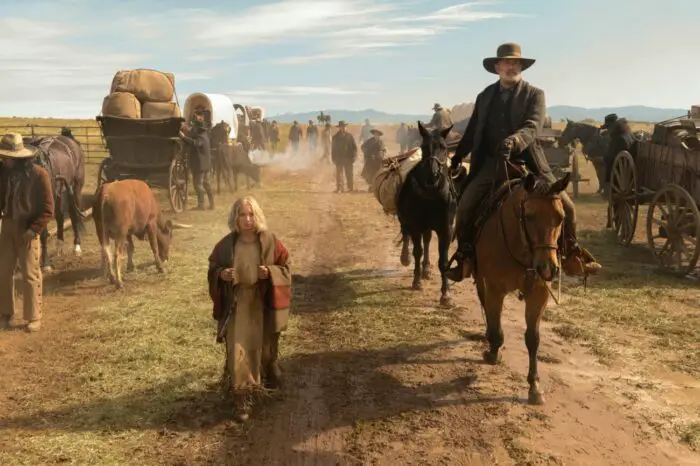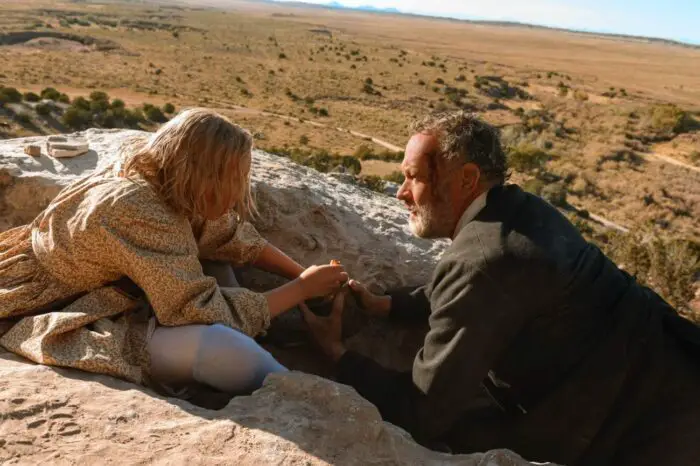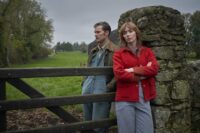The new Paul Greengrass film News of the World is a quieter journey of peril and principles than the director’s usual stronger concentrations. The movie and its elements have a stern simplicity fitting of the western genre it occupies. Nothing is laid on too thick for the sake of showing off. The poetic term that comes to mind for the movie is the tag of “dramatic effect.”
You’ve heard that term tossed around before. It will follow “with” and “for” as a preposition to end a few sentences. Adjectives like “great,” “equal,” “more,” or “most” might come in front of it. The phrase denotes something with a purpose to move the spectator or the audience. The best dramatic effects are measured more than carelessly swung around.
News of the World feeds off those carefully selected extra points of emphasis. You have Tom Hanks in his first western, and playing his true mid-60s age no less, for a change. He portrays a character who speaks with a keen sense of dramatic effect for his listeners. The actor and character occupy a movie that strives well to stay natural with believable aesthetics that are never gaudy. It’s grit without grittiness, and there’s a place for that in the western genre where not everything has to kick like 100-proof frontier whiskey.

The two-time Oscar winner plays Captain Jefferson Kyle Kidd, a Confederate veteran and widower who goes town-to-town through the state of Texas in 1870 reading selected newspapers from a portfolio of collected publications from around the world. He will advertise his arrival and get dressed up with his tie and pocket watch for whatever hall or podium is provided to him. Eager locals drop their nickels and dimes in a tin can to hear him, as he assuages like a Sarsaparilla Cronkite, “escape our troubles and hear the great changes” of the world.
There is a captivation that comes from the connectivity of news. Today, we have this lesson instantly accessible with television and the internet. An influential new event will draw our attention and we’re quickly glued to screens big and small. That effect hasn’t changed, only the speed and the vessels. With his words, inflection, and honesty, Kidd continues the rolling wind of oral tradition that used to spread our news, culture, education, and history. All of this “distant magic” unfurled by Kidd’s little touches of performance and showmanship brings the world closer and captivates his listeners. Best of all, and contrary—in a tongue-in-cheek way—to how news has to be fact-checked today for validity, his sources were true rather than false.
The Captain’s travelling tour is interrupted near Wichita Falls when he encounters an abandoned little fair-skinned and platinum blond girl (Helena Zengel of System Crasher) oddly dressed in Native American regalia. The paper orders found in the upturned wagon declare that her name is Johanna Leonburger, a child kidnapped by the Kiowa tribe six years prior. She was en route to being reunited with her German immigrant family south of San Antonio. Upon arriving in Dallas to a runaround from the Army authorities and background guidance from an innkeeper ladylove (TV star Elizabeth Marvel of Homeland), Kidd takes on the pity and courtesy as a former father himself to take the girl the rest of the way downstate for the daunting 400-mile trek.
Kidd isn’t a hermit by any means, but having a curious presence like Johanna around is a lift for him and his simple solitude. As a character laments, “stories only keep you company for so long.” Illiterate to English or the customary ways of things, the girl learns behaviors and decorums from the patient newsman. In return, she educates him with a dose of “to go forward you must remember,” where the groundedness of the here-and-now can matter more than the printed records found in his news clippings.

Going back to the notion of “dramatic effect,” watch the way Hanks puts an arm on Zengel and holds her hand wherever they go. The generous senior and toughened youth convey their young-and-old/oil-and-water bond in a very endearing way. Tom is terrific playing this man of moral heart where his righteousness comes in promise more than merely presence alone. The courage is always on and, when necessary, the stoicism as well.
True to Paulette Jiles’ 2016 source novel of the same name, this wagon trail quest is fraught with social and geographic challenges. This Texas, five years after the end of the Civil War, is loose with central control, allowing rich grandstanders like Merrit Farley (veteran character actor Thomas Francis Murphy) and criminal elements like human trafficker Almay (indie actor and producer Michael Angelo Covino of The Climb and Kicks) mostly free reign to do what they want and accost who they please. Even with some hollering and holsters every now and then, News the World is a western of rhetoric instead of rage.
The production sure looks the part even without all the amplified noise. Esteemed composer and eight-time Oscar nominee James Newton Howard provides all the auditory cadence necessary. Visually, you would be hard-pressed to spot extra stage lighting from regular Ridley Scott cinematographer Dariusz Wolski and his army of grips, riggers, and best boys. Filmed in New Mexico, News of the World is truly lantern-lit and broke by the dawn where the special effects seem invisible. You’re squinting in the sun outside and searching through the glow inside. That’s a proper western.
News of the World is truly softer work from Paul Greengrass and that is a welcome addition to his resume. Its unreserved earthiness, outlined by Greengrass and Lion Oscar nominee Luke Davies, matches the book quite suitably as well. The genre motifs have shadings to inspire and awe just fine. The themes ring more bells for longform closure than any arresting immediacy of action for action’s sake. Methodical as that pace may be, one would say it’s all very ruminative, albeit, and here it comes, “for dramatic effect.”



